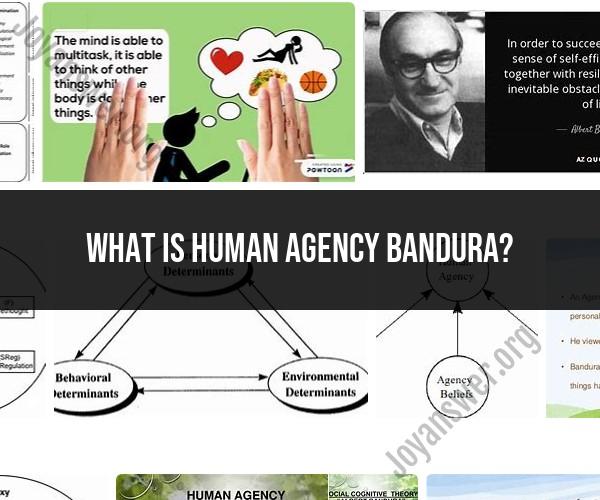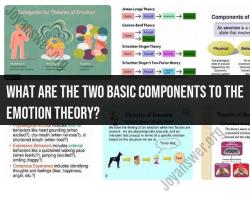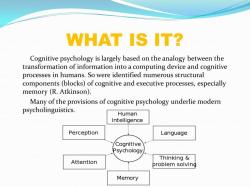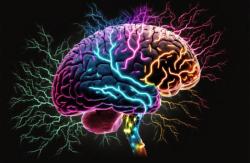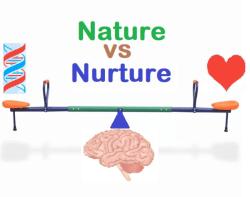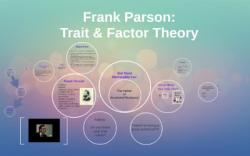What is human agency bandura?
Human agency, as described in Albert Bandura's social cognitive theory, refers to the capacity of individuals to act intentionally and make choices that influence their own lives and the social environments in which they operate. Bandura's theory emphasizes the active role that individuals play in shaping their thoughts, behaviors, and outcomes, and it highlights several key components of human agency:
Intentionality: Human agency involves setting goals, making plans, and taking deliberate actions to achieve desired outcomes. It is driven by purpose and intention.
Forethought: Individuals engage in a process of forethought, which involves thinking about the future, anticipating potential consequences of their actions, and setting goals based on these considerations. This mental process helps guide their behavior.
Self-Regulation: Human agency includes the ability to self-regulate, meaning individuals can monitor and adjust their behaviors, thoughts, and emotions to align with their goals and values. Self-regulation involves self-control and the ability to delay gratification when necessary.
Self-Reflection: Individuals engage in self-reflection to evaluate their own performance and progress toward their goals. This self-assessment allows them to make necessary adjustments and improvements.
Self-Efficacy: Bandura's theory places a strong emphasis on self-efficacy, which is an individual's belief in their own ability to achieve specific goals and perform particular tasks. High self-efficacy is associated with greater motivation and persistence in pursuing goals.
Social Context: While individuals have the capacity for agency, Bandura also recognizes the role of social influences and environmental factors in shaping behavior. People are not isolated agents but are influenced by the social and cultural context in which they live.
Reciprocal Determinism: Bandura's theory incorporates the concept of reciprocal determinism, which means that behavior, personal factors (e.g., beliefs, emotions), and environmental factors (e.g., social norms, opportunities) interact and influence each other in a dynamic and bidirectional manner. This perspective acknowledges that individuals can influence and are influenced by their environments.
In summary, Bandura's theory of human agency highlights the idea that individuals are not passive recipients of their life experiences but active agents who can shape their own lives through intentionality, planning, self-regulation, and belief in their capabilities. This perspective has been influential in understanding various aspects of human behavior, including motivation, self-control, and the acquisition of new skills.
Understanding Human Agency: Insights from Bandura's Theory
Human agency is the ability to act independently and make one's own choices. It is the power to influence one's own life and the world around us. Albert Bandura's theory of social cognitive learning provides a valuable framework for understanding human agency.
Bandura's theory posits that people learn through observation, imitation, and reinforcement. However, he also emphasized the role of self-efficacy in human agency. Self-efficacy is the belief in one's ability to succeed in a particular situation. Bandura argued that people are more likely to act on their intentions when they have high self-efficacy.
Bandura's theory also highlights the importance of triadic reciprocal causation in human agency. Triadic reciprocal causation is the interaction between personal factors (e.g., self-efficacy), environmental factors (e.g., rewards and punishments), and behavioral factors (e.g., actions). Bandura argued that all three factors influence each other and contribute to human agency.
The Role of Human Agency in Personal Development
Human agency plays a vital role in personal development. It allows people to set goals, make plans, and take action to achieve their goals. Human agency also enables people to overcome challenges and setbacks.
People with high self-efficacy are more likely to set challenging goals and persist in the face of obstacles. They are also more likely to learn from their mistakes and improve their performance over time.
Applying Bandura's Concept of Human Agency in Practice
There are a number of ways to apply Bandura's concept of human agency in practice. For example, parents and teachers can help children to develop a strong sense of self-efficacy by providing them with opportunities to succeed and by praising their efforts.
Individuals can also boost their own self-efficacy by setting realistic goals, developing a plan to achieve their goals, and breaking down large tasks into smaller, more manageable steps. It is also important to learn from mistakes and setbacks, and to celebrate successes along the way.
Here are some additional tips for applying Bandura's concept of human agency in practice:
- Set specific and measurable goals. The more specific and measurable your goals are, the easier it will be to track your progress and stay motivated.
- Develop a plan to achieve your goals. Once you have set your goals, break them down into smaller, more manageable steps. This will make your goals seem less daunting and more achievable.
- Take action towards your goals. Don't just sit around and think about your goals. Take action towards achieving them, even if it is just a small step.
- Learn from your mistakes. Everyone makes mistakes. The important thing is to learn from them and move on.
- Celebrate your successes. When you achieve a goal, take some time to celebrate your success. This will help to boost your self-efficacy and motivate you to keep moving forward.
By applying Bandura's concept of human agency, you can increase your self-efficacy, achieve your goals, and live a more fulfilling life.
